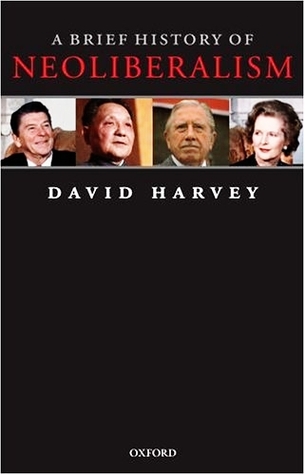More on this book
Community
Kindle Notes & Highlights
Neoliberalism is in the first instance a theory of political economic practices that proposes that human well-being can best be advanced by liberating individual entrepreneurial freedoms and skills within an institutional framework characterized by strong private property rights, free markets, and free trade.
We can, therefore, interpret neoliberalization either as a utopian project to realize a theoretical design for the reorganization of international capitalism or as a political project to re-establish the conditions for capital accumulation and to restore the power of economic elites.
Neoliberalization has meant, in short, the financialization of everything.
This history of neoliberalization and class formation, and the proliferating acceptance of the ideas of the Mont Pelerin Society as the ruling ideas of the time, makes for interesting reading when placed against the background of counter-arguments laid out by Karl Polanyi in 1944 (shortly before the Mont Pelerin Society was established). In a complex society, he pointed out, the meaning of freedom becomes as contradictory and as fraught as its incitements to action are compelling. There are, he noted, two kinds of freedom, one good and the other bad. Among the latter he listed ‘the freedom to
...more
The passing of [the] market economy can become the beginning of an era of unprecedented freedom. Juridical and actual freedom can be made wider and more general than ever before; regulation and control can achieve freedom not only for the few, but for all. Freedom not as an appurtenance of privilege, tainted at the source, but as a prescriptive right extending far beyond the narrow confines of the political sphere into the intimate organization of society itself. Thus will old freedoms and civic rights be added to the fund of new freedoms generated by the leisure and security that industrial
...more
Planning and control are being attacked as a denial of freedom. Free enterprise and private ownership are declared to be essentials of freedom. No society built on other foundations is said to deserve to be called free. The freedom that regulation creates is denounced as unfreedom; the justice, liberty and welfare it offers are decried as a camouflage of slavery.
The idea of freedom ‘thus degenerates into a mere advocacy of free enterprise’, which means ‘the fullness of freedom for those whose income, leisure and security need no enhancing, and a mere pittance of liberty for the people, who may in vain attempt to make use of their democratic rights to gain shelter from the power of the owners of property’. But if, as is always the case, ‘no society is possible in which power and compulsion are absent, nor a world in which force has no function’, then the only way this liberal utopian vision could be sustained is by force, violence, and
...more
There are some shadowy areas as well as points of conflict within the general theory of the neoliberal state. First, there is the problem of how to interpret monopoly power.
The second major arena of controversy concerns market failure. This arises when individuals and firms avoid paying the full costs attributable to them by shedding their liabilities outside the market (the liabilities are, in technical parlance, ‘externalized’). The classic case is that of pollution, where individuals and firms avoid costs by dumping noxious wastes free of charge in the environment.
All agents acting in the market are generally presumed to have access to the same information. There are presumed to be no asymmetries of power or of information that interfere with the capacity of individuals to make rational economic decisions in their own interests.


